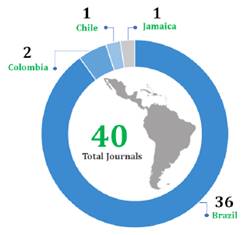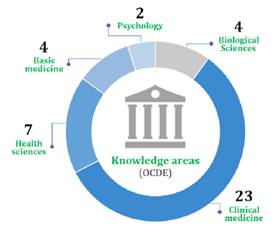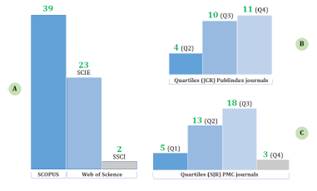Dear Editor:
The National Library of Medicine (NLM) of the United States is the largest medical content library in the world. One of its purposes is to support research and provide access to reliable information (Marill, 2016). Its main product is MEDLINE, and PubMed is the public search interface. PubMed has provided greater access to research and its expansion has led to the inclusion of PubMed Central (PMC) and the National Center for Biotechnology Information (NCBI); other NLM resources that may be associated with PubMed are the NLM catalog, PubMed Health, and MedlinePlus (Williamson & Minter, 2019).
To include a journal in PMC, the NLM assesses its impact, scientific, editorial, and technical quality, as well as its editorial practices (National Library of Medicine, 2020a). The NLM also continuously monitors the above aspects plus the volume of content published, changes in policy, and possible systemic problems reported by users (Williamson & Minter, 2019). Without a doubt, this is a process that few scientific journals achieve in their international indexing projects. Still, the International Journal of Psychological Research (IJPR) met the standards and managed to be listed in PMC.
PMC is an open access digital repository that archives full-text scientific articles from biomedical and life science journals; it is one of the main research databases developed and managed by NCBI, and owned by the NLM (National Library of Medicine, 2020b). One of the objectives of the NLM is the preservation of the content of the biomedical and life sciences. PMC fulfills that purpose. Its design and structure allow storing, preserving, and providing free access to the best scientific content. Storage is done in eXtensible Markup Language (XML), a metalanguage that represents the structure and meaning of an article in a simple and clear way for both computer systems and people. The XML used is JAST, provided by the National Information Standards Organization (NISO), a standardized markup format for journal articles: Journal Article Tag Suite JATS (NISO, 2020).
IJPR is an editorial project that began in 2008, publishes every six months in an open access way, and aims to disseminate original articles, evaluated by peers, that respond to current social needs and problems. The editorial and scientific quality of the articles published, dealing with human behavior, psychiatry, neuroscience, and mental health, have allowed it to be indexed in the most prominent citation indexes: Scopus and Web of Science. In addition, it managed this year to advance from quartile 4 (Q4) to quartile 3 (Q3) of the Scimago Journal & Country Rank (SJR), as well as being indexed in PMC.
After these cascading achievements that IJPR has been exhibiting these years, I set out to identify the Latin American journals in PMC, discriminate them by country, fields of knowledge and indexations in Scopus and Web of Science. I also had the purpose of reviewing the current status of Colombia’s journals, especially those that could be potential publications for PMC. To achieve the previous goals, the list of journals from PMC (National Library of Medicine, 2020c), the Scimago database (Scimago Journal & Country Rank, 2020), the main collection of Web of Science (Clarivate, 2020), the call 830 of the Publindex bibliographic index database (Sistema nacional de ciencia tecnología e innovación, 2020) were examined, and the journals were categorized by field of knowledge following the classification model of the Organisation for Economic Cooperation and Development (OECD, 2015). The cut-off date of the information taken from the databases was July 15, 2020.
Once the PMC data were analyzed of Me (National Library of Medicine, 2020c), it was found that the total of indexed journals is 3194. Of this total, 40 are from Latin America, equivalent to 1.25%. The distribution by country was as follows: 36 from Brazil, 2 from Colombia, 1 from Chile, and 1 from Jamaica (See Figure 1). When distributing the 40 journals by field of knowledge, according to the classification of the Organisation for Economic Cooperation and Development (OECD, 2015), it was found that 23 are from clinical medicine, 7 from health sciences, 4 from medicine basic, 4 of biological sciences, and 2 of psychology (see Figure 2). When reviewing how many of these journals are indexed by Scopus and Web of Science (Clarivate, 2020; Scimago Journal & Country Rank, 2020), it was found that 39 are in Scopus, equivalent to 97.5%, and 25 in WOS, equivalent to 62.5%: 23 are part of the Science Citation Index Expanded (SCIE) and 2 of the Social Sciences Citation Index (SSCI) (see Figure 3a). The impact was also identified and grouped by fields of knowledge, taking as a reference the distribution by quartiles made by the JCR and SJR. Four journals were located in the JCR in Q2, 10 in Q3, and 11 in Q4 (see Figure 3b); 5 journals were located in the SJR in Q1, 13 in Q2, 18 in Q3, and 3 in Q4 (see Figure 3c).
Regarding Colombian journals indexed by the Publindex bibliographic index, done by the National System of Science, Technology and Innovation (Sistema Nacional de Ciencia, Tecnología e Innovación, SNCTI), only publications with the following fields of knowledge were taken into account: basic medicine, clinical medicine, health sciences, others medical sciences, biological sciences, and psychology, potential fields for inclusion in PMC. It was found that Publindex indexed in its last call a total of 275 journals in all fields of knowledge. Of that total, only 63 are part of the categories mentioned above and distributed as follows: 2 from basic medicine, 14 from clinical medicine, 18 from health sciences, 4 from
other medical sciences, 8 from biological sciences, and 17 from psychology (see Figure 4). Once identified and categorized the journals by field of knowledge, we proceeded to review how many of them were indexed in Scopus, WOS, and PMC. The result was as follows: of the 63 journals, 27 are found in Scopus, 8 in WOS (5 in SCIE and 3 in SSCI), and 2 in PMC (see Figure 5a). The impact was also identified and grouped by fields of knowledge, taking as reference the distribution by quartiles made by the JCR and the SJR. 2 were located in the JCR in Q3 and 6 in Q4 (see Figure 5b); in the SJR 3 were located in Q2, 10 in Q3, and 13 in Q4, for a total of 26; and the remaining journal currently does not have SJR for 2019 (see Figure 5c).
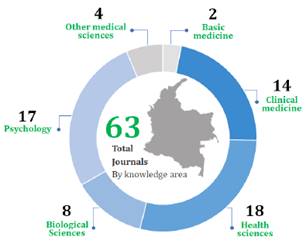
Figure 4 Colombian journals of medical and health sciences, biological sciences, and psychology indexed by Publindex
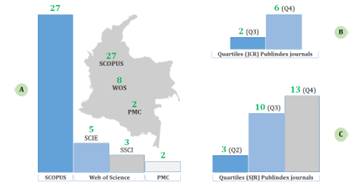
Figure 5 Colombian journals of medical and health sciences, biological sciences, and psychology indexed by SCOPUS, WOS, and PMC
With the results obtained, the first thing that can be observed is that in Latin America there are a small number of biomedical and life science journals indexed in PMC: only 1.25%, with Brazil being the country with the largest number of participating journals. Secondly, the participation of two Psychology journals indexed in PMC stands out: Psicologia: Reflexão e Crítica from Brazil and the International Journal of Psychological Research IJPR from Colombia. The first journal has 33 volumes published to date and had its beginnings in 1986. For its part, IJPR has 13 published volumes and began in 2008. The indexation in PMC shows the editorial and scientific quality and, in particular, the rapid rise of IJPR in its field of knowledge. Both journals are indexed in Scopus and Web of Science. In the latter, they are precisely the only Latin American journals that are part of the Social Sciences Citation Index (SSCI), while the others are in the Science Citation Index Expanded (SCIE). Good news for Colombia is that IJPR is the second Colombian journal indexed in PMC, alongside Colombia Médica; in addition to being the first psychology journal indexed in PMC in the country, it is the second in Latin America.
Currently, Colombia has a significant number of journals that could initiate the PMC indexing process (see Figure 4), especially the journals in basic medicine, clinical medicine, health sciences, other medical sciences, biological sciences, and psychology ones that make a contribution to the biomedical and life sciences. Of those 63 there are 27 in Scopus and 8 in WOS, making them potential candidates, given the recognition of international citation indexes.
When submitting their journals, editors should take into account PMC’s policies (National Library of Medicine, 2020d), their requirements (National Library of Medicine, 2020a), and advance in each of the stages proposed by the selection. In addition to taking care of scientific and editorial quality, it is suggested that journals adopt good editorial practices, including those given by the International Committee of Medical Journal Editors (ICMJE, 2019), the Committee on Publication Ethics (COPE, 2020), the World Association of Medical Editors (WAME, 2020), the principles of transparency and best practices in academic publications (DOAJ, 2018), and the guidelines of the Council of Scientific Editors (CSE, 2020).
Although there is a significant difference in the resources for research and scientific publishing in the region, since they are seen, in many cases, as a cost and not as a strategic investment that allows development and social impact (López-López, 2019), Latin America has an important editorial and scientific niche that must be supported by public and private institutions: support for research in the region and support for editing and training editors with international standards. The most immediate challenge for IJPR will be joining MEDLINE.
There is already an important step in the indexing process: being in PMC.













